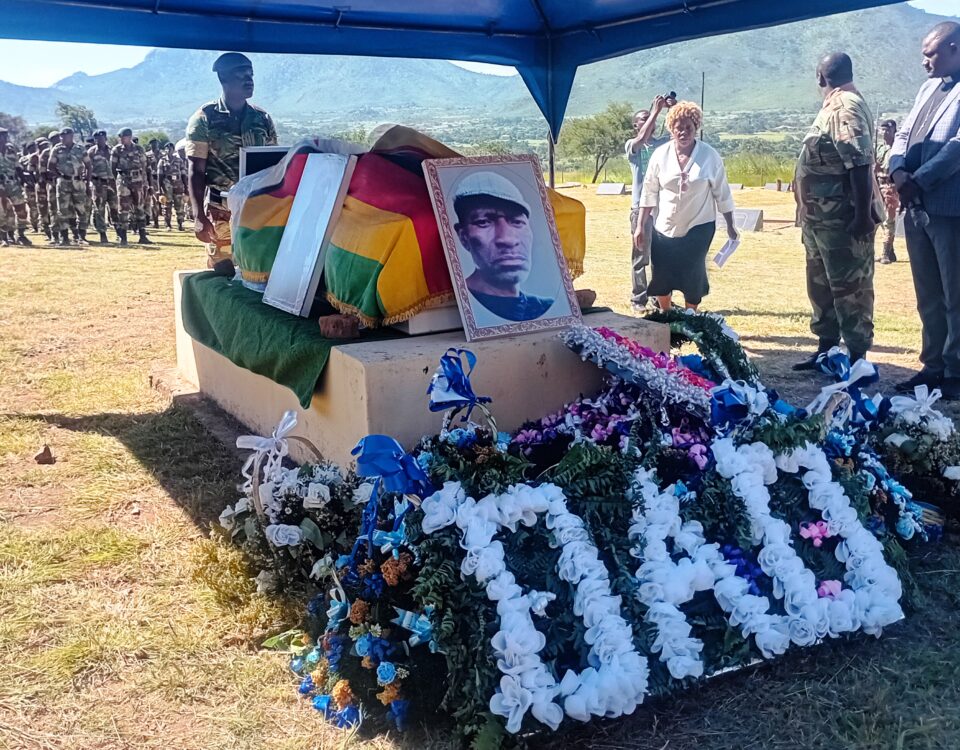
Mutare vegetable vendors clash with municipality over new market stall fees
September 3, 2020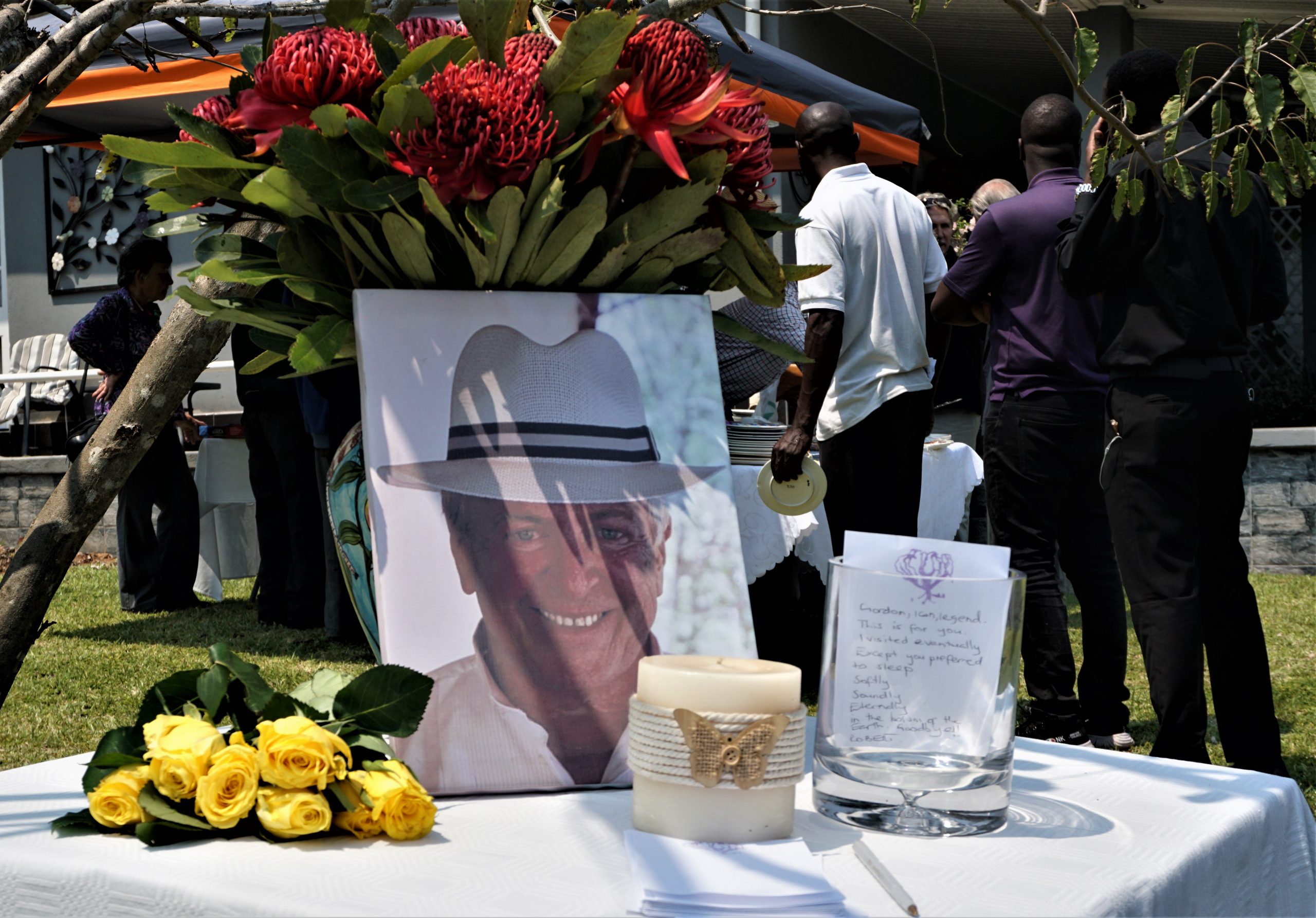
Renowned hotelier Gordon laid to rest, conferred a hotelier par excellence
September 17, 2020Zimbabwe’s import syndrome prompts high-priced blood
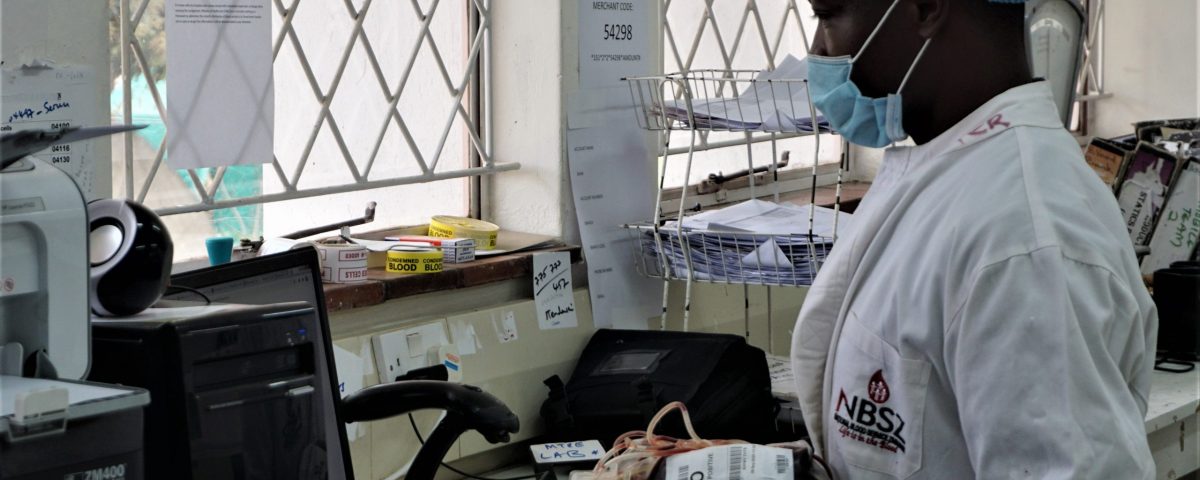
A NBZS Mutare lab scientist going through the blood service process during a recently held Mutare media tour.
… NBSZ launch Facebook Zimbabwe blood donation platform
Ngoni Dapira
ZIMBABWE’s import syndrome at the expense of incentivizing local production has once again been fingered as the main reason why the country’s blood service costs are so high.
The country’s sole blood bank service revealed that the high cost of blood services for a unit of blood is largely because most of its basic inputs, including test kits and blood packs are imported. This means foreign currency is required to procure the essential raw materials, which swells the ultimate cost of blood service.
National Blood Service of Zimbabwe (NBSZ) public affairs manager Esther Massundah during a virtual media education workshop hosted recently by NBSZ admitted that the service cost of blood in the country is too high, but mostly blamed the high import costs and penchant of relying on imported goods at the expense of promoting local production to cut costs.
Government has often been highly criticized for its import syndrome despite having the capacity to grow local industry and manufacture its own scientific and engineering products through its institutions like the Scientific and Industrial Research and Development Centre (SIRDC), which is underutilised. NBSZ revealed that most inputs are being imported from neighbouring South Africa, which manufactures some of the products, whilst some machinery is imported from Europe and China.
According to the Afro World Health Organisation (WHO) 2017 report, in Africa the approximate average costs of producing a unit of whole blood, which is 450mls, is US$82. However, in Zimbabwe the cost was reduced from US$135 to US$80 in November 2017, but has since gone up again due to the increasing hyper-inflationary environment in the country. A unit of blood currently costs $11 500 ZW, which is US$153, based on the 1:75 current official foreign exchange rate.
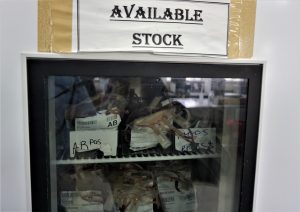
The blood bank in Mutare.
“Yes, we do understand that the cost is on the high side but it’s all about cost recovery for us as a non-profit making organisation… The blood packs and test kits are all imported, but if they were locally produced this could greatly assist in cost reduction. On the issue of free blood transfusion in public hospitals and not in private hospitals, Government only considered patients in public hospitals under the assumption that those that seek treatment in private hospitals have health insurance. It’s beyond us unfortunately,” said Massundah.
She however said in private hospitals the hospital-based replacement donor system can be used alternatively if an elderly patient has a family member who is an active blood donor.
Massundah added that under covid-19, NBSZ has however been considering other approaches on reducing cost recovery from the stages of procuring blood up to the end where the blood is transfused to patients. She said nonetheless, cost recovery remains the greatest funding source for them as a non-profit making organization with no foreign donor support.
Government has only been subsidizing blood services in public hospitals for patients to get free blood transfusion. However, patients admitted in private hospitals are expected to pay for their own blood service costs. Government committed to subsidize cost of blood for its patients in government hospitals in June 2018, following public outcry about the high cost of blood, which was making it difficult for underprivileged patients to get quality health care. Through the subsidy coupon system, government hospitals request blood from NBSZ for their patients using coupons, which are later on redeemed from Treasury.
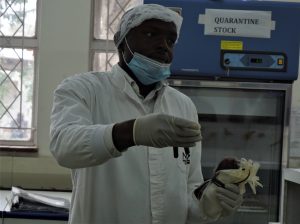
NBSZ Mutare lab scientist Lovemore Chamunorwa.
During a media tour of the NBSZ Mutare centre before the online meeting, NBSZ Mutare lab scientist Lovemore Chamunorwa said the two critical issues which overshadow transfusion are supply and cost.
“Please note that blood itself is free. What we are charging is the cost of service, the cross testing and matching of blood. After including facilities, paying back equipment costs, which are mostly imported, the specialized staff and office overheads, the costs are bound to be high, especially if there is no external financial aid in the form of international donors,” said Chamunorwa.
While cost recovery on blood services is a heavy toll order for NBSZ, Government has also been feeling the pinch of subsiding the coupon system in public hospitals. In July, following the continued increase in costs coupled with late payments by Government, the NBSZ resolved to suspend the coupon system and demanded cash upfront from government institutions. Government however reportedly made a down payment of ZW$43 million immediately, but remained with about ZW$126 million, to cover the whole debt, which covered the period February to May 2020. Massundah however confirmed that present-day the debt has since been cleared.
NBSZ lifted the suspension straightaway, but that incident alone is a sign to brace for hard times in the health sector, given the increasing hyper-inflationary economic upheavals in the country. Sustainability of the coupon system under government subsidy is uncertain, especially when it is overburdened by covid-19 expenses that are proving to be overstretched for the already insolvent Government.
Massundah said they are working on a transformational strategy for 2020 to 2023 in view of the ‘new normal’ way of life under covid-19. This includes sustainable approaches of securing the country’s blood bank and more awareness on the importance of blood, especially during the global covid-19 pandemic.
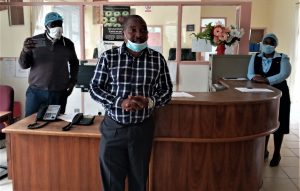
Nick Muparutsa (centre) during the NBSZ Mutare media tour.
NBSZ Manicaland planning and recruitment officer Nick Muparutsa said there are still a lot of myths about blood donations that need to be demystified to encourage voluntary blood donations. He gave an example of how some apostolic faith churches still discourage blood donations because of religious beliefs. Muparutsa added that under the covid-19 era another myth that has cropped up is that one can contract the coronavirus by donating blood, which he dismissed as untrue given their professional screening and blood service standards.
He also revealed that due to closure of some big companies in Manicaland and adoption of lean employment strategies by large scale companies, blood donations from the formal employment sector, especially the manufacturing industry, have been recording a sharp decline, and its worse under covid-19.
With schools, tertiary and higher learning institutions closed NBSZ mostly now relies on setting up mobile community blood donation centres, a programme that was started in April after the covid-19 lockdown measures were enforced on March 30 this year.
“We used to go to companies like Mutare Bottling Company, Tanganda Tea Company, Cairns to mention a few, but due to covid-19 measures and limited staff going to work, it is no longer feasible to do company blood donation visits. The closure of many companies in Mutare also affected the impact of this programme and have been concentrating more on schools as our biggest blood bank. We mostly collect blood through mobile outreach (90 percent) and our static clinic (10 percent),” said Muparutsa.
Muparutsa added that the average demand for blood by Manicaland hospitals is 400 units and the excess is often sent to Harare where demand is higher because of excess referral public hospitals.
“The minimum requirements to be a blood donor, one must be between the ages of 16 to 60 years old, weigh more than 50kg’s and be in good health. For regular male donors they are expected to donate blood once in every three months while females it’s once in every four months,” he said.
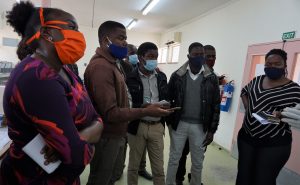
Mutare journalists during the media tour.
The Manicaland virtual media training workshop drew 28 journalists from both public and private media. Zimbabwe Union of Journalists (ZUJ) Manicaland chairman Ray Bande said the virtual training and tour of the Mutare centre was critical for journalists to hear firsthand information and write from an informed view to the public. Bande urged corporates to engage the media on sensitisation programmes for broader outreach to the public through the various media institutions affiliated to ZUJ.
Meanwhile, today (Wednesday) NBSZ launched its Facebook Zimbabwe blood donation platform in partnership with Facebook Africa, which is in collaboration with the World Health Organisation (WHO).
Massundah said Facebook noticed how people were using its platform to ask about blood donations and saw an opportunity to make their experience better and safer. Whilst on their part as NBSZ, covid-19 has shown them the need to come up with more innovative ways of recruiting blood donors in an environment where people are encouraged to stay home.
“NBSZ engaged Facebook in May 2020, expressing interest in the blood donations process feature tool which was being promoted globally…We’ve now partnered with Facebook to launch a new blood donation feature today, which will allow users to get notified about nearby blood donation opportunities, set reminders and invite their friends to donate too,” she said.
The tool is said to have already helped to recruit more than 70 million blood donors globally, and Facebook Africa director for public policy Kojo Boakye said Zimbabwe is now the eighth African country to join and the second in Southern Africa. “Outside Africa there is USA, Brazil, India, Pakistan and Bangladesh. In Africa there is South Africa, Egypt, Burkina Faso, Kenya, Senegal, Côte d’Ivoire, Nigeria and now Zimbabwe,” said Boakye.


